Ethics, Organization, and Society: Case Study of Amazon's Dilemmas
VerifiedAdded on 2020/01/23
|14
|4791
|77
Report
AI Summary
This report examines ethical dilemmas within organizations, using Amazon as a case study. It identifies an ethical dilemma related to communication problems arising from a diverse workforce. The report analyzes the affected stakeholders, including employees, customers, and suppliers, and maps the impact of corporate social responsibility on these groups. It explores the role of management in evaluating perspectives, emphasizing the importance of ethical conduct, health and safety, technology management, transparency, and fair working conditions. The report reflects on the issue through the lens of social and normative ethical theories, providing recommendations for addressing ethical dilemmas. It stresses the importance of values, ethical leadership, and the creation of a positive ethical culture. Furthermore, it offers insights into effective strategies for resolving ethical dilemmas, emphasizing the need for ethical codes and management support. The report concludes with an appreciation of managerial ethics, advocating for the development of ethical awareness and responsible decision-making within organizations. It provides a comprehensive roadmap for generating solutions to ethical challenges in the corporate environment.
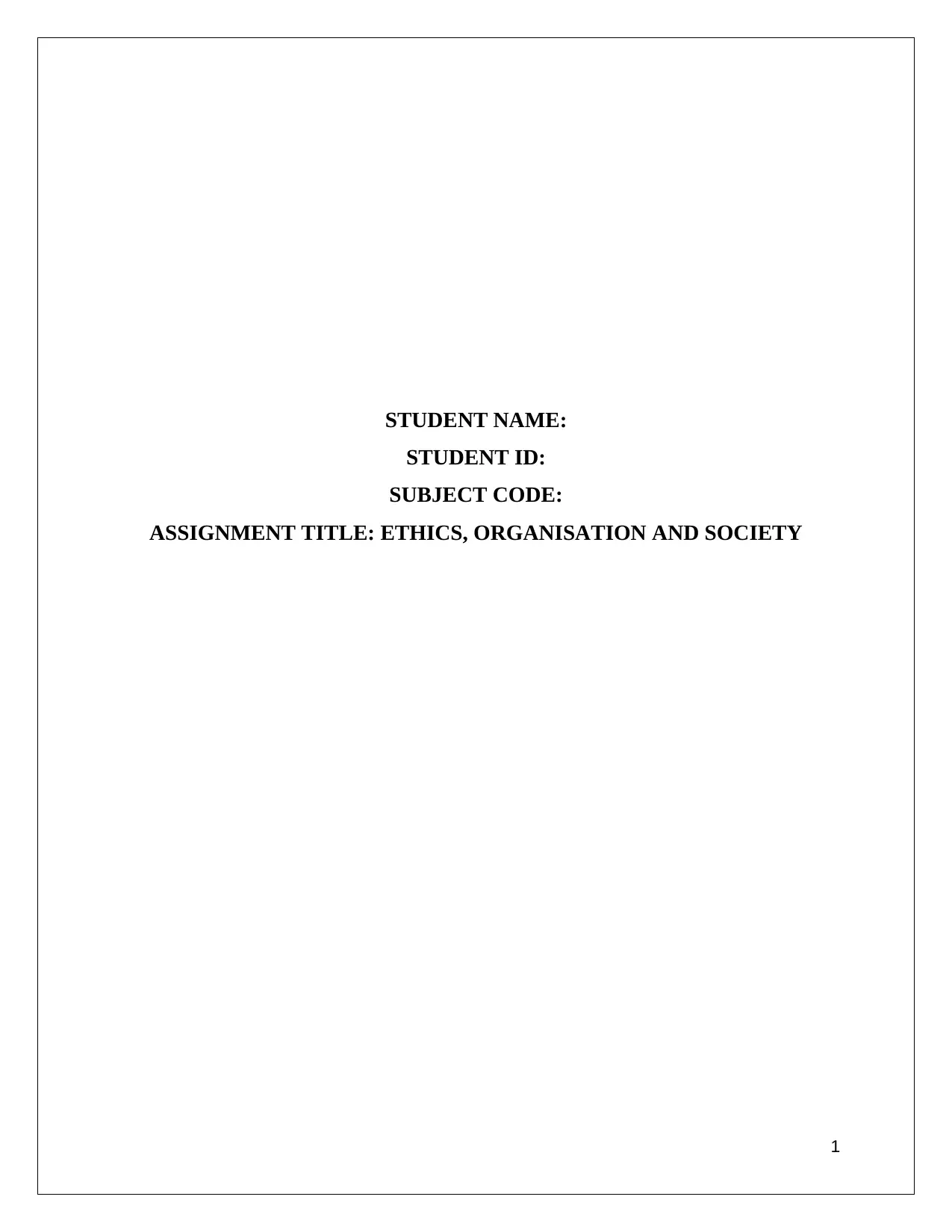
STUDENT NAME:
STUDENT ID:
SUBJECT CODE:
ASSIGNMENT TITLE: ETHICS, ORGANISATION AND SOCIETY
1
STUDENT ID:
SUBJECT CODE:
ASSIGNMENT TITLE: ETHICS, ORGANISATION AND SOCIETY
1
Paraphrase This Document
Need a fresh take? Get an instant paraphrase of this document with our AI Paraphraser
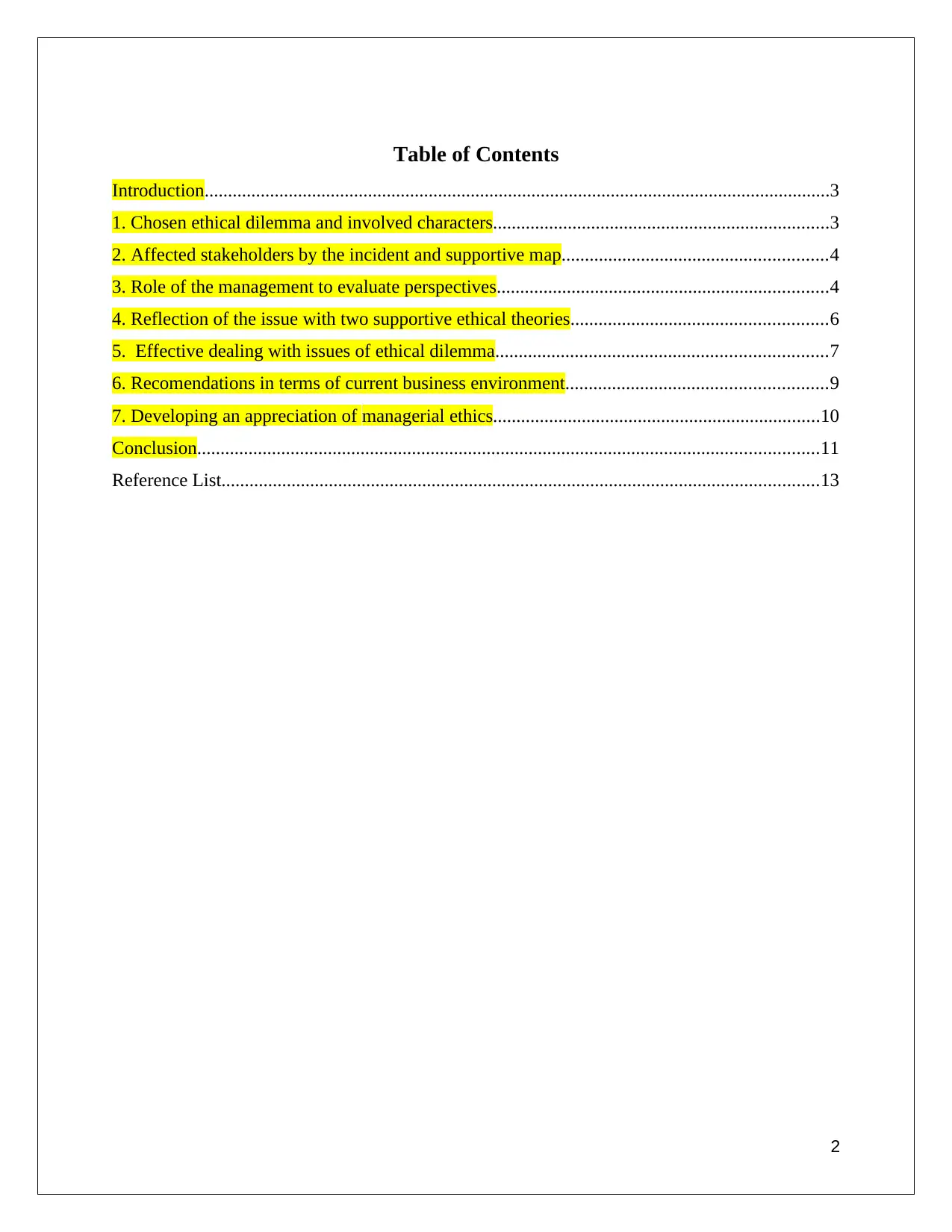
Table of Contents
Introduction......................................................................................................................................3
1. Chosen ethical dilemma and involved characters........................................................................3
2. Affected stakeholders by the incident and supportive map.........................................................4
3. Role of the management to evaluate perspectives.......................................................................4
4. Reflection of the issue with two supportive ethical theories.......................................................6
5. Effective dealing with issues of ethical dilemma.......................................................................7
6. Recomendations in terms of current business environment........................................................9
7. Developing an appreciation of managerial ethics......................................................................10
Conclusion.....................................................................................................................................11
Reference List................................................................................................................................13
2
Introduction......................................................................................................................................3
1. Chosen ethical dilemma and involved characters........................................................................3
2. Affected stakeholders by the incident and supportive map.........................................................4
3. Role of the management to evaluate perspectives.......................................................................4
4. Reflection of the issue with two supportive ethical theories.......................................................6
5. Effective dealing with issues of ethical dilemma.......................................................................7
6. Recomendations in terms of current business environment........................................................9
7. Developing an appreciation of managerial ethics......................................................................10
Conclusion.....................................................................................................................................11
Reference List................................................................................................................................13
2
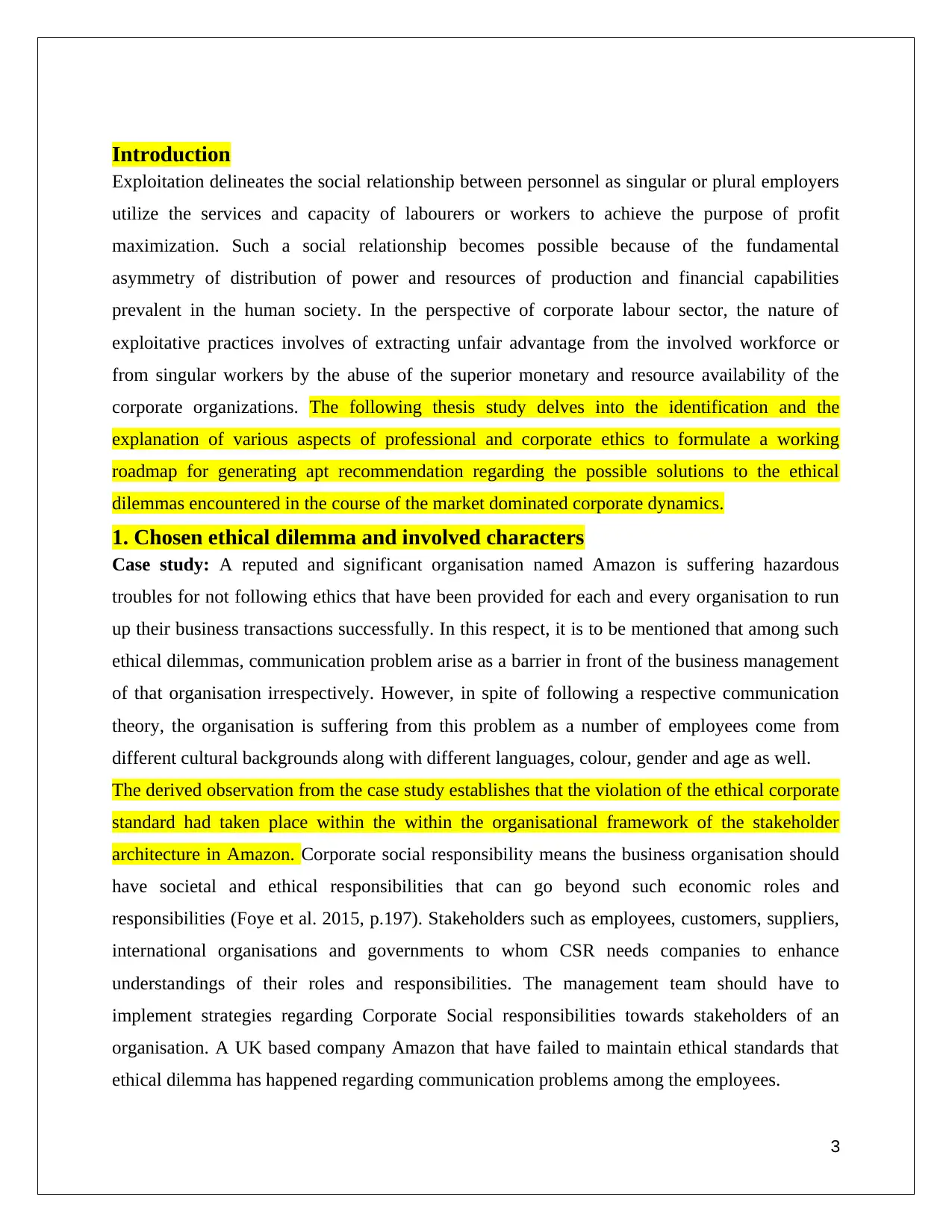
Introduction
Exploitation delineates the social relationship between personnel as singular or plural employers
utilize the services and capacity of labourers or workers to achieve the purpose of profit
maximization. Such a social relationship becomes possible because of the fundamental
asymmetry of distribution of power and resources of production and financial capabilities
prevalent in the human society. In the perspective of corporate labour sector, the nature of
exploitative practices involves of extracting unfair advantage from the involved workforce or
from singular workers by the abuse of the superior monetary and resource availability of the
corporate organizations. The following thesis study delves into the identification and the
explanation of various aspects of professional and corporate ethics to formulate a working
roadmap for generating apt recommendation regarding the possible solutions to the ethical
dilemmas encountered in the course of the market dominated corporate dynamics.
1. Chosen ethical dilemma and involved characters
Case study: A reputed and significant organisation named Amazon is suffering hazardous
troubles for not following ethics that have been provided for each and every organisation to run
up their business transactions successfully. In this respect, it is to be mentioned that among such
ethical dilemmas, communication problem arise as a barrier in front of the business management
of that organisation irrespectively. However, in spite of following a respective communication
theory, the organisation is suffering from this problem as a number of employees come from
different cultural backgrounds along with different languages, colour, gender and age as well.
The derived observation from the case study establishes that the violation of the ethical corporate
standard had taken place within the within the organisational framework of the stakeholder
architecture in Amazon. Corporate social responsibility means the business organisation should
have societal and ethical responsibilities that can go beyond such economic roles and
responsibilities (Foye et al. 2015, p.197). Stakeholders such as employees, customers, suppliers,
international organisations and governments to whom CSR needs companies to enhance
understandings of their roles and responsibilities. The management team should have to
implement strategies regarding Corporate Social responsibilities towards stakeholders of an
organisation. A UK based company Amazon that have failed to maintain ethical standards that
ethical dilemma has happened regarding communication problems among the employees.
3
Exploitation delineates the social relationship between personnel as singular or plural employers
utilize the services and capacity of labourers or workers to achieve the purpose of profit
maximization. Such a social relationship becomes possible because of the fundamental
asymmetry of distribution of power and resources of production and financial capabilities
prevalent in the human society. In the perspective of corporate labour sector, the nature of
exploitative practices involves of extracting unfair advantage from the involved workforce or
from singular workers by the abuse of the superior monetary and resource availability of the
corporate organizations. The following thesis study delves into the identification and the
explanation of various aspects of professional and corporate ethics to formulate a working
roadmap for generating apt recommendation regarding the possible solutions to the ethical
dilemmas encountered in the course of the market dominated corporate dynamics.
1. Chosen ethical dilemma and involved characters
Case study: A reputed and significant organisation named Amazon is suffering hazardous
troubles for not following ethics that have been provided for each and every organisation to run
up their business transactions successfully. In this respect, it is to be mentioned that among such
ethical dilemmas, communication problem arise as a barrier in front of the business management
of that organisation irrespectively. However, in spite of following a respective communication
theory, the organisation is suffering from this problem as a number of employees come from
different cultural backgrounds along with different languages, colour, gender and age as well.
The derived observation from the case study establishes that the violation of the ethical corporate
standard had taken place within the within the organisational framework of the stakeholder
architecture in Amazon. Corporate social responsibility means the business organisation should
have societal and ethical responsibilities that can go beyond such economic roles and
responsibilities (Foye et al. 2015, p.197). Stakeholders such as employees, customers, suppliers,
international organisations and governments to whom CSR needs companies to enhance
understandings of their roles and responsibilities. The management team should have to
implement strategies regarding Corporate Social responsibilities towards stakeholders of an
organisation. A UK based company Amazon that have failed to maintain ethical standards that
ethical dilemma has happened regarding communication problems among the employees.
3
⊘ This is a preview!⊘
Do you want full access?
Subscribe today to unlock all pages.

Trusted by 1+ million students worldwide
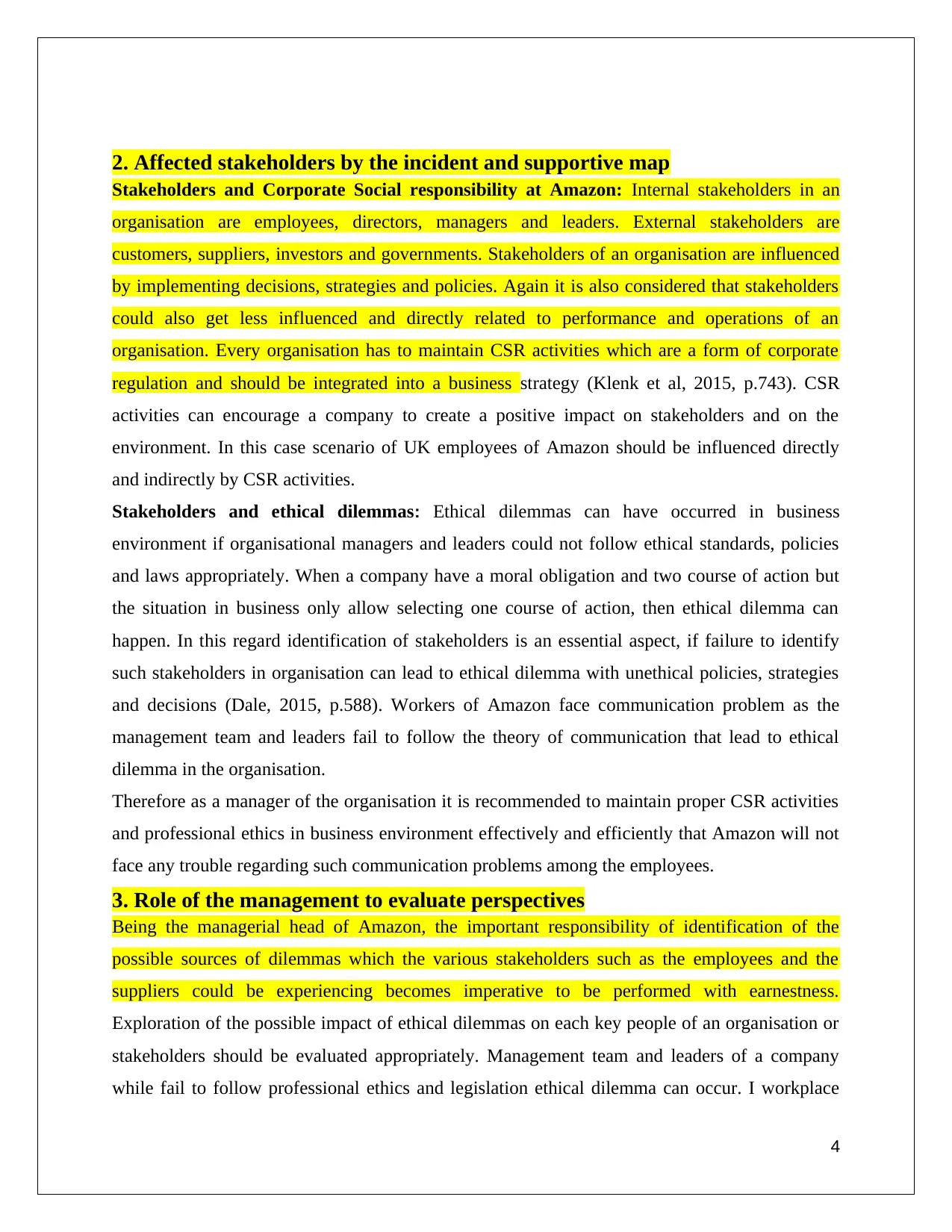
2. Affected stakeholders by the incident and supportive map
Stakeholders and Corporate Social responsibility at Amazon: Internal stakeholders in an
organisation are employees, directors, managers and leaders. External stakeholders are
customers, suppliers, investors and governments. Stakeholders of an organisation are influenced
by implementing decisions, strategies and policies. Again it is also considered that stakeholders
could also get less influenced and directly related to performance and operations of an
organisation. Every organisation has to maintain CSR activities which are a form of corporate
regulation and should be integrated into a business strategy (Klenk et al, 2015, p.743). CSR
activities can encourage a company to create a positive impact on stakeholders and on the
environment. In this case scenario of UK employees of Amazon should be influenced directly
and indirectly by CSR activities.
Stakeholders and ethical dilemmas: Ethical dilemmas can have occurred in business
environment if organisational managers and leaders could not follow ethical standards, policies
and laws appropriately. When a company have a moral obligation and two course of action but
the situation in business only allow selecting one course of action, then ethical dilemma can
happen. In this regard identification of stakeholders is an essential aspect, if failure to identify
such stakeholders in organisation can lead to ethical dilemma with unethical policies, strategies
and decisions (Dale, 2015, p.588). Workers of Amazon face communication problem as the
management team and leaders fail to follow the theory of communication that lead to ethical
dilemma in the organisation.
Therefore as a manager of the organisation it is recommended to maintain proper CSR activities
and professional ethics in business environment effectively and efficiently that Amazon will not
face any trouble regarding such communication problems among the employees.
3. Role of the management to evaluate perspectives
Being the managerial head of Amazon, the important responsibility of identification of the
possible sources of dilemmas which the various stakeholders such as the employees and the
suppliers could be experiencing becomes imperative to be performed with earnestness.
Exploration of the possible impact of ethical dilemmas on each key people of an organisation or
stakeholders should be evaluated appropriately. Management team and leaders of a company
while fail to follow professional ethics and legislation ethical dilemma can occur. I workplace
4
Stakeholders and Corporate Social responsibility at Amazon: Internal stakeholders in an
organisation are employees, directors, managers and leaders. External stakeholders are
customers, suppliers, investors and governments. Stakeholders of an organisation are influenced
by implementing decisions, strategies and policies. Again it is also considered that stakeholders
could also get less influenced and directly related to performance and operations of an
organisation. Every organisation has to maintain CSR activities which are a form of corporate
regulation and should be integrated into a business strategy (Klenk et al, 2015, p.743). CSR
activities can encourage a company to create a positive impact on stakeholders and on the
environment. In this case scenario of UK employees of Amazon should be influenced directly
and indirectly by CSR activities.
Stakeholders and ethical dilemmas: Ethical dilemmas can have occurred in business
environment if organisational managers and leaders could not follow ethical standards, policies
and laws appropriately. When a company have a moral obligation and two course of action but
the situation in business only allow selecting one course of action, then ethical dilemma can
happen. In this regard identification of stakeholders is an essential aspect, if failure to identify
such stakeholders in organisation can lead to ethical dilemma with unethical policies, strategies
and decisions (Dale, 2015, p.588). Workers of Amazon face communication problem as the
management team and leaders fail to follow the theory of communication that lead to ethical
dilemma in the organisation.
Therefore as a manager of the organisation it is recommended to maintain proper CSR activities
and professional ethics in business environment effectively and efficiently that Amazon will not
face any trouble regarding such communication problems among the employees.
3. Role of the management to evaluate perspectives
Being the managerial head of Amazon, the important responsibility of identification of the
possible sources of dilemmas which the various stakeholders such as the employees and the
suppliers could be experiencing becomes imperative to be performed with earnestness.
Exploration of the possible impact of ethical dilemmas on each key people of an organisation or
stakeholders should be evaluated appropriately. Management team and leaders of a company
while fail to follow professional ethics and legislation ethical dilemma can occur. I workplace
4
Paraphrase This Document
Need a fresh take? Get an instant paraphrase of this document with our AI Paraphraser
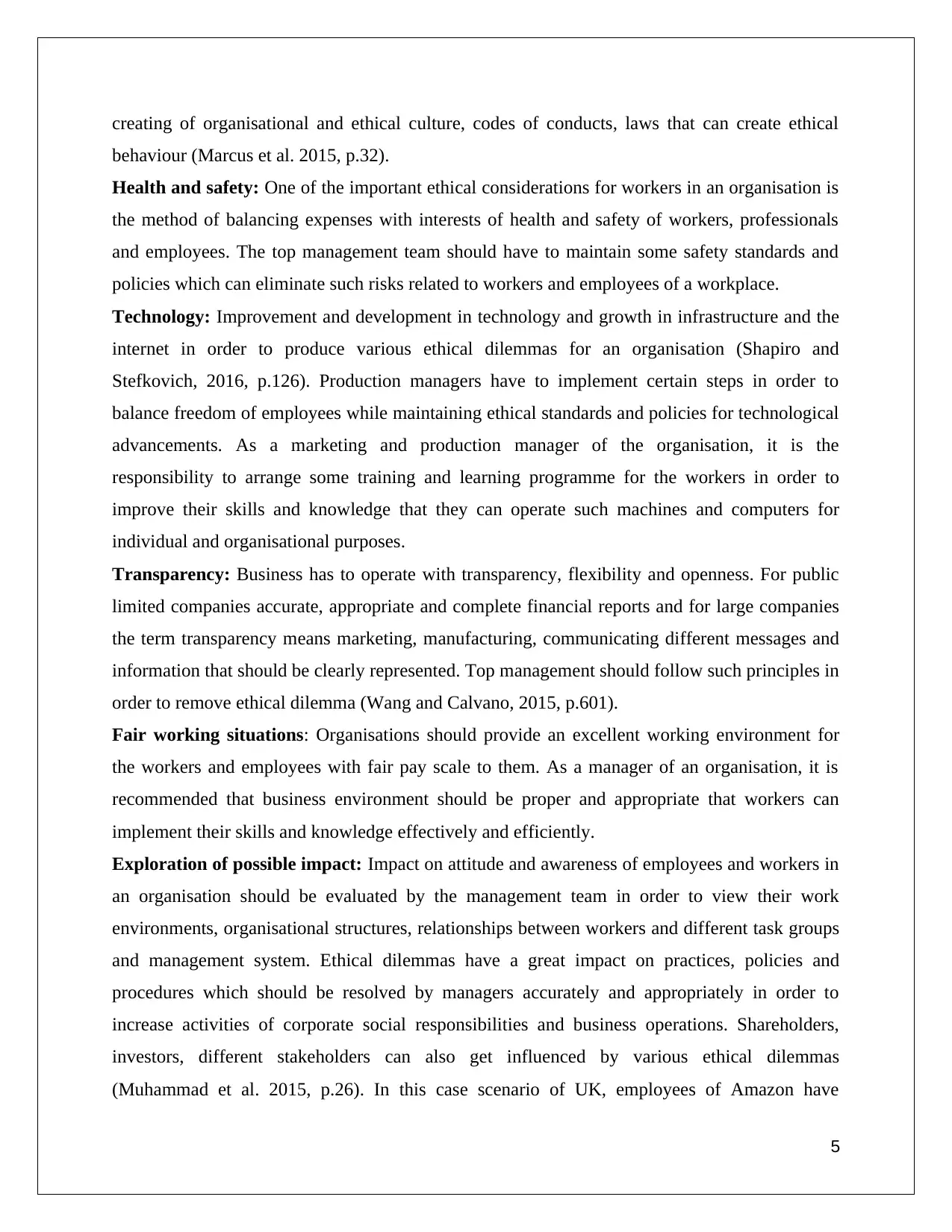
creating of organisational and ethical culture, codes of conducts, laws that can create ethical
behaviour (Marcus et al. 2015, p.32).
Health and safety: One of the important ethical considerations for workers in an organisation is
the method of balancing expenses with interests of health and safety of workers, professionals
and employees. The top management team should have to maintain some safety standards and
policies which can eliminate such risks related to workers and employees of a workplace.
Technology: Improvement and development in technology and growth in infrastructure and the
internet in order to produce various ethical dilemmas for an organisation (Shapiro and
Stefkovich, 2016, p.126). Production managers have to implement certain steps in order to
balance freedom of employees while maintaining ethical standards and policies for technological
advancements. As a marketing and production manager of the organisation, it is the
responsibility to arrange some training and learning programme for the workers in order to
improve their skills and knowledge that they can operate such machines and computers for
individual and organisational purposes.
Transparency: Business has to operate with transparency, flexibility and openness. For public
limited companies accurate, appropriate and complete financial reports and for large companies
the term transparency means marketing, manufacturing, communicating different messages and
information that should be clearly represented. Top management should follow such principles in
order to remove ethical dilemma (Wang and Calvano, 2015, p.601).
Fair working situations: Organisations should provide an excellent working environment for
the workers and employees with fair pay scale to them. As a manager of an organisation, it is
recommended that business environment should be proper and appropriate that workers can
implement their skills and knowledge effectively and efficiently.
Exploration of possible impact: Impact on attitude and awareness of employees and workers in
an organisation should be evaluated by the management team in order to view their work
environments, organisational structures, relationships between workers and different task groups
and management system. Ethical dilemmas have a great impact on practices, policies and
procedures which should be resolved by managers accurately and appropriately in order to
increase activities of corporate social responsibilities and business operations. Shareholders,
investors, different stakeholders can also get influenced by various ethical dilemmas
(Muhammad et al. 2015, p.26). In this case scenario of UK, employees of Amazon have
5
behaviour (Marcus et al. 2015, p.32).
Health and safety: One of the important ethical considerations for workers in an organisation is
the method of balancing expenses with interests of health and safety of workers, professionals
and employees. The top management team should have to maintain some safety standards and
policies which can eliminate such risks related to workers and employees of a workplace.
Technology: Improvement and development in technology and growth in infrastructure and the
internet in order to produce various ethical dilemmas for an organisation (Shapiro and
Stefkovich, 2016, p.126). Production managers have to implement certain steps in order to
balance freedom of employees while maintaining ethical standards and policies for technological
advancements. As a marketing and production manager of the organisation, it is the
responsibility to arrange some training and learning programme for the workers in order to
improve their skills and knowledge that they can operate such machines and computers for
individual and organisational purposes.
Transparency: Business has to operate with transparency, flexibility and openness. For public
limited companies accurate, appropriate and complete financial reports and for large companies
the term transparency means marketing, manufacturing, communicating different messages and
information that should be clearly represented. Top management should follow such principles in
order to remove ethical dilemma (Wang and Calvano, 2015, p.601).
Fair working situations: Organisations should provide an excellent working environment for
the workers and employees with fair pay scale to them. As a manager of an organisation, it is
recommended that business environment should be proper and appropriate that workers can
implement their skills and knowledge effectively and efficiently.
Exploration of possible impact: Impact on attitude and awareness of employees and workers in
an organisation should be evaluated by the management team in order to view their work
environments, organisational structures, relationships between workers and different task groups
and management system. Ethical dilemmas have a great impact on practices, policies and
procedures which should be resolved by managers accurately and appropriately in order to
increase activities of corporate social responsibilities and business operations. Shareholders,
investors, different stakeholders can also get influenced by various ethical dilemmas
(Muhammad et al. 2015, p.26). In this case scenario of UK, employees of Amazon have
5
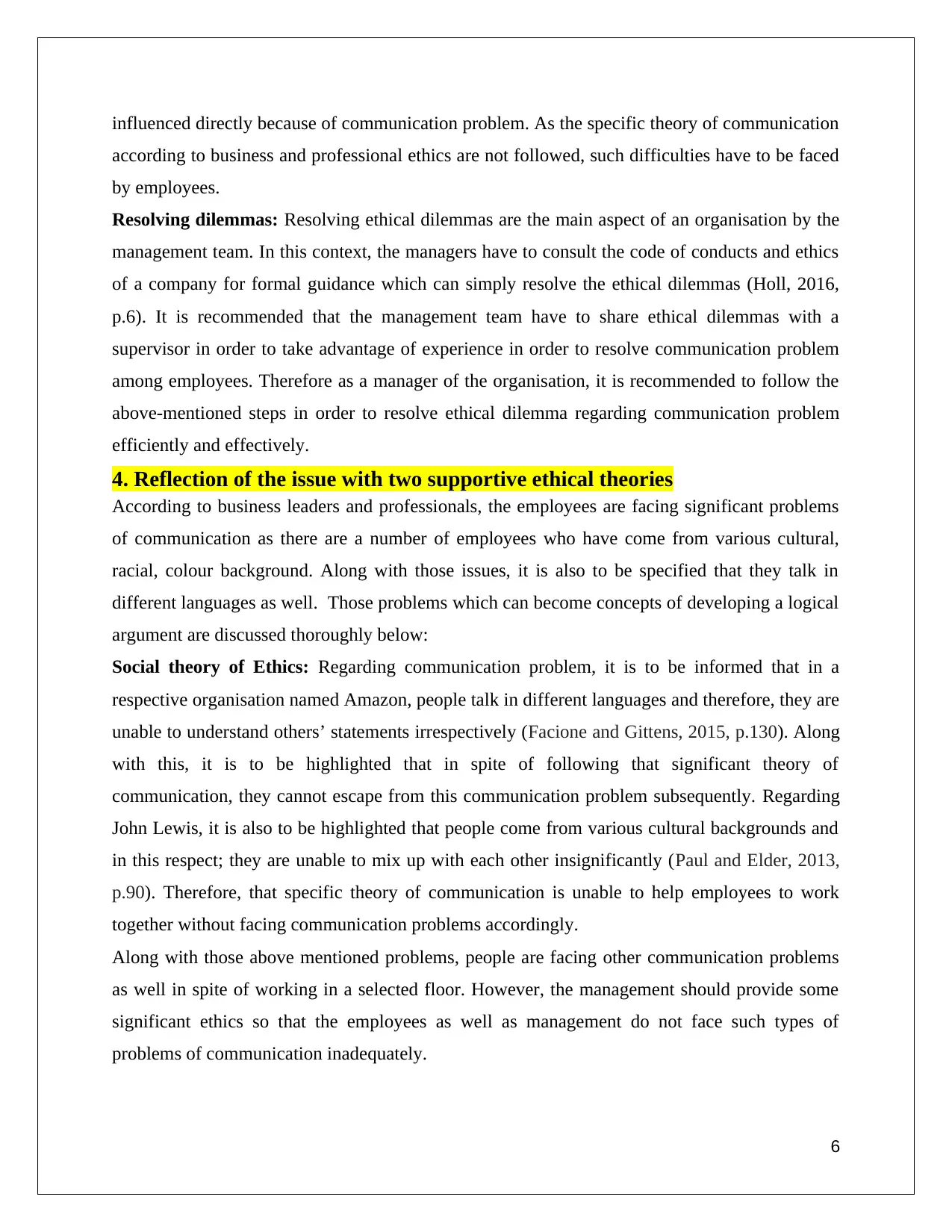
influenced directly because of communication problem. As the specific theory of communication
according to business and professional ethics are not followed, such difficulties have to be faced
by employees.
Resolving dilemmas: Resolving ethical dilemmas are the main aspect of an organisation by the
management team. In this context, the managers have to consult the code of conducts and ethics
of a company for formal guidance which can simply resolve the ethical dilemmas (Holl, 2016,
p.6). It is recommended that the management team have to share ethical dilemmas with a
supervisor in order to take advantage of experience in order to resolve communication problem
among employees. Therefore as a manager of the organisation, it is recommended to follow the
above-mentioned steps in order to resolve ethical dilemma regarding communication problem
efficiently and effectively.
4. Reflection of the issue with two supportive ethical theories
According to business leaders and professionals, the employees are facing significant problems
of communication as there are a number of employees who have come from various cultural,
racial, colour background. Along with those issues, it is also to be specified that they talk in
different languages as well. Those problems which can become concepts of developing a logical
argument are discussed thoroughly below:
Social theory of Ethics: Regarding communication problem, it is to be informed that in a
respective organisation named Amazon, people talk in different languages and therefore, they are
unable to understand others’ statements irrespectively (Facione and Gittens, 2015, p.130). Along
with this, it is to be highlighted that in spite of following that significant theory of
communication, they cannot escape from this communication problem subsequently. Regarding
John Lewis, it is also to be highlighted that people come from various cultural backgrounds and
in this respect; they are unable to mix up with each other insignificantly (Paul and Elder, 2013,
p.90). Therefore, that specific theory of communication is unable to help employees to work
together without facing communication problems accordingly.
Along with those above mentioned problems, people are facing other communication problems
as well in spite of working in a selected floor. However, the management should provide some
significant ethics so that the employees as well as management do not face such types of
problems of communication inadequately.
6
according to business and professional ethics are not followed, such difficulties have to be faced
by employees.
Resolving dilemmas: Resolving ethical dilemmas are the main aspect of an organisation by the
management team. In this context, the managers have to consult the code of conducts and ethics
of a company for formal guidance which can simply resolve the ethical dilemmas (Holl, 2016,
p.6). It is recommended that the management team have to share ethical dilemmas with a
supervisor in order to take advantage of experience in order to resolve communication problem
among employees. Therefore as a manager of the organisation, it is recommended to follow the
above-mentioned steps in order to resolve ethical dilemma regarding communication problem
efficiently and effectively.
4. Reflection of the issue with two supportive ethical theories
According to business leaders and professionals, the employees are facing significant problems
of communication as there are a number of employees who have come from various cultural,
racial, colour background. Along with those issues, it is also to be specified that they talk in
different languages as well. Those problems which can become concepts of developing a logical
argument are discussed thoroughly below:
Social theory of Ethics: Regarding communication problem, it is to be informed that in a
respective organisation named Amazon, people talk in different languages and therefore, they are
unable to understand others’ statements irrespectively (Facione and Gittens, 2015, p.130). Along
with this, it is to be highlighted that in spite of following that significant theory of
communication, they cannot escape from this communication problem subsequently. Regarding
John Lewis, it is also to be highlighted that people come from various cultural backgrounds and
in this respect; they are unable to mix up with each other insignificantly (Paul and Elder, 2013,
p.90). Therefore, that specific theory of communication is unable to help employees to work
together without facing communication problems accordingly.
Along with those above mentioned problems, people are facing other communication problems
as well in spite of working in a selected floor. However, the management should provide some
significant ethics so that the employees as well as management do not face such types of
problems of communication inadequately.
6
⊘ This is a preview!⊘
Do you want full access?
Subscribe today to unlock all pages.

Trusted by 1+ million students worldwide
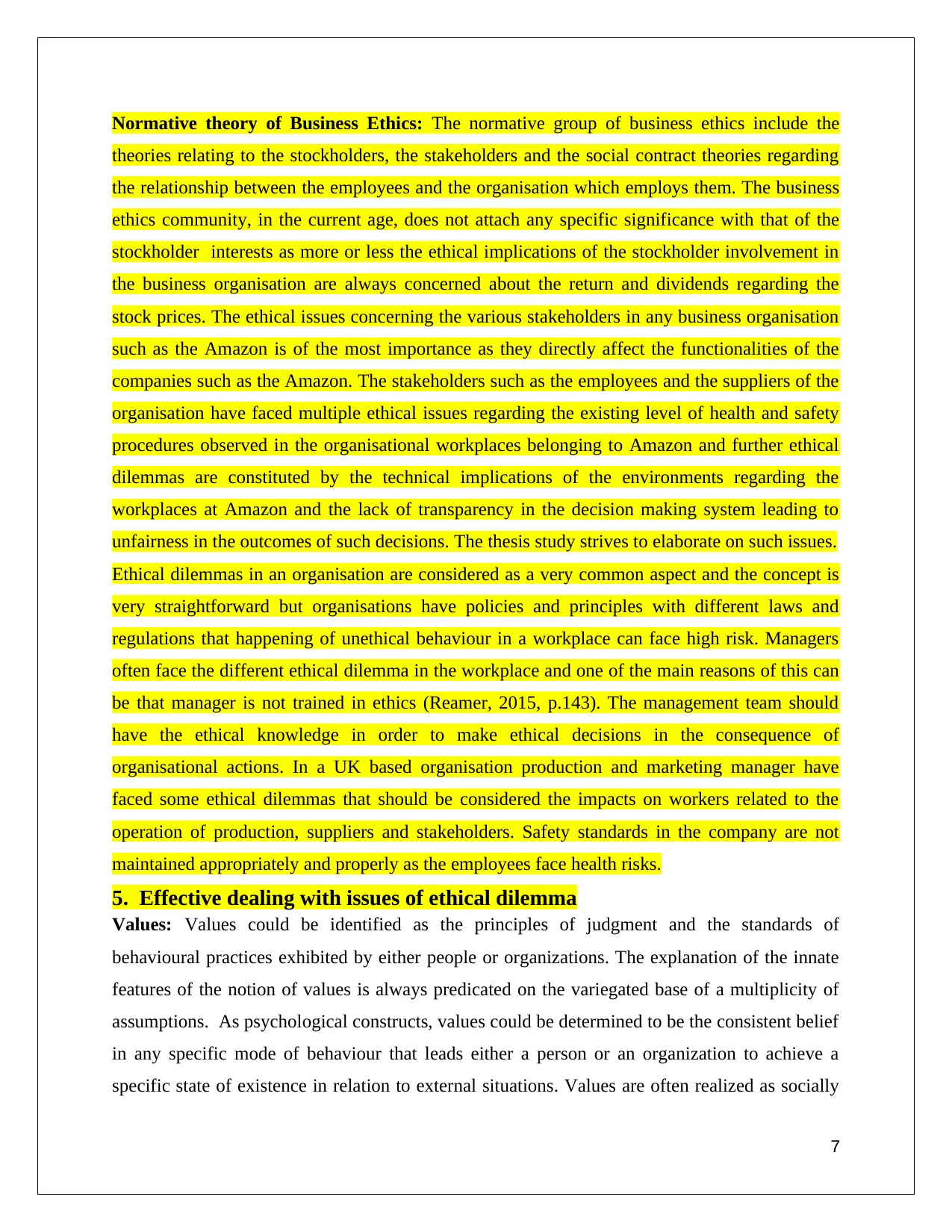
Normative theory of Business Ethics: The normative group of business ethics include the
theories relating to the stockholders, the stakeholders and the social contract theories regarding
the relationship between the employees and the organisation which employs them. The business
ethics community, in the current age, does not attach any specific significance with that of the
stockholder interests as more or less the ethical implications of the stockholder involvement in
the business organisation are always concerned about the return and dividends regarding the
stock prices. The ethical issues concerning the various stakeholders in any business organisation
such as the Amazon is of the most importance as they directly affect the functionalities of the
companies such as the Amazon. The stakeholders such as the employees and the suppliers of the
organisation have faced multiple ethical issues regarding the existing level of health and safety
procedures observed in the organisational workplaces belonging to Amazon and further ethical
dilemmas are constituted by the technical implications of the environments regarding the
workplaces at Amazon and the lack of transparency in the decision making system leading to
unfairness in the outcomes of such decisions. The thesis study strives to elaborate on such issues.
Ethical dilemmas in an organisation are considered as a very common aspect and the concept is
very straightforward but organisations have policies and principles with different laws and
regulations that happening of unethical behaviour in a workplace can face high risk. Managers
often face the different ethical dilemma in the workplace and one of the main reasons of this can
be that manager is not trained in ethics (Reamer, 2015, p.143). The management team should
have the ethical knowledge in order to make ethical decisions in the consequence of
organisational actions. In a UK based organisation production and marketing manager have
faced some ethical dilemmas that should be considered the impacts on workers related to the
operation of production, suppliers and stakeholders. Safety standards in the company are not
maintained appropriately and properly as the employees face health risks.
5. Effective dealing with issues of ethical dilemma
Values: Values could be identified as the principles of judgment and the standards of
behavioural practices exhibited by either people or organizations. The explanation of the innate
features of the notion of values is always predicated on the variegated base of a multiplicity of
assumptions. As psychological constructs, values could be determined to be the consistent belief
in any specific mode of behaviour that leads either a person or an organization to achieve a
specific state of existence in relation to external situations. Values are often realized as socially
7
theories relating to the stockholders, the stakeholders and the social contract theories regarding
the relationship between the employees and the organisation which employs them. The business
ethics community, in the current age, does not attach any specific significance with that of the
stockholder interests as more or less the ethical implications of the stockholder involvement in
the business organisation are always concerned about the return and dividends regarding the
stock prices. The ethical issues concerning the various stakeholders in any business organisation
such as the Amazon is of the most importance as they directly affect the functionalities of the
companies such as the Amazon. The stakeholders such as the employees and the suppliers of the
organisation have faced multiple ethical issues regarding the existing level of health and safety
procedures observed in the organisational workplaces belonging to Amazon and further ethical
dilemmas are constituted by the technical implications of the environments regarding the
workplaces at Amazon and the lack of transparency in the decision making system leading to
unfairness in the outcomes of such decisions. The thesis study strives to elaborate on such issues.
Ethical dilemmas in an organisation are considered as a very common aspect and the concept is
very straightforward but organisations have policies and principles with different laws and
regulations that happening of unethical behaviour in a workplace can face high risk. Managers
often face the different ethical dilemma in the workplace and one of the main reasons of this can
be that manager is not trained in ethics (Reamer, 2015, p.143). The management team should
have the ethical knowledge in order to make ethical decisions in the consequence of
organisational actions. In a UK based organisation production and marketing manager have
faced some ethical dilemmas that should be considered the impacts on workers related to the
operation of production, suppliers and stakeholders. Safety standards in the company are not
maintained appropriately and properly as the employees face health risks.
5. Effective dealing with issues of ethical dilemma
Values: Values could be identified as the principles of judgment and the standards of
behavioural practices exhibited by either people or organizations. The explanation of the innate
features of the notion of values is always predicated on the variegated base of a multiplicity of
assumptions. As psychological constructs, values could be determined to be the consistent belief
in any specific mode of behaviour that leads either a person or an organization to achieve a
specific state of existence in relation to external situations. Values are often realized as socially
7
Paraphrase This Document
Need a fresh take? Get an instant paraphrase of this document with our AI Paraphraser
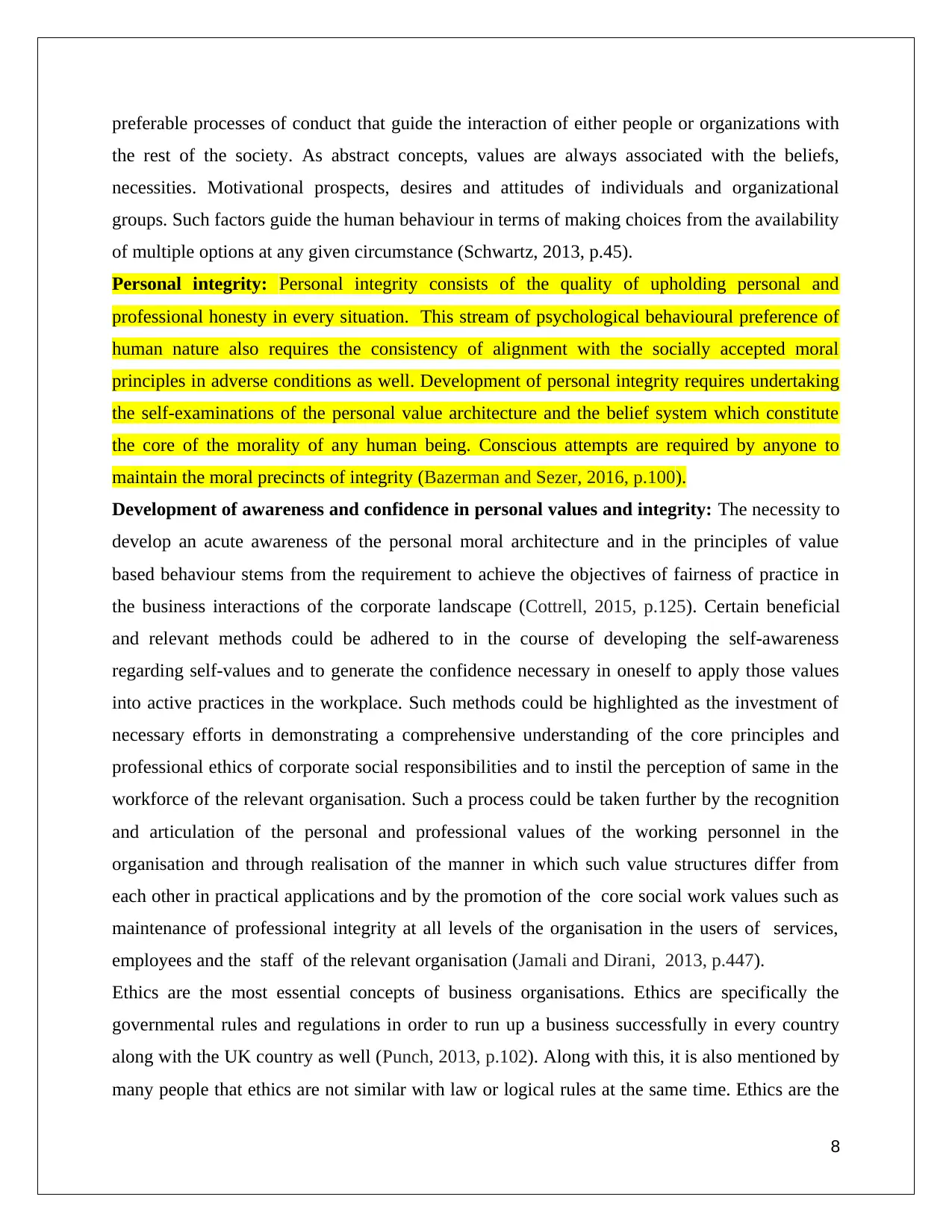
preferable processes of conduct that guide the interaction of either people or organizations with
the rest of the society. As abstract concepts, values are always associated with the beliefs,
necessities. Motivational prospects, desires and attitudes of individuals and organizational
groups. Such factors guide the human behaviour in terms of making choices from the availability
of multiple options at any given circumstance (Schwartz, 2013, p.45).
Personal integrity: Personal integrity consists of the quality of upholding personal and
professional honesty in every situation. This stream of psychological behavioural preference of
human nature also requires the consistency of alignment with the socially accepted moral
principles in adverse conditions as well. Development of personal integrity requires undertaking
the self-examinations of the personal value architecture and the belief system which constitute
the core of the morality of any human being. Conscious attempts are required by anyone to
maintain the moral precincts of integrity (Bazerman and Sezer, 2016, p.100).
Development of awareness and confidence in personal values and integrity: The necessity to
develop an acute awareness of the personal moral architecture and in the principles of value
based behaviour stems from the requirement to achieve the objectives of fairness of practice in
the business interactions of the corporate landscape (Cottrell, 2015, p.125). Certain beneficial
and relevant methods could be adhered to in the course of developing the self-awareness
regarding self-values and to generate the confidence necessary in oneself to apply those values
into active practices in the workplace. Such methods could be highlighted as the investment of
necessary efforts in demonstrating a comprehensive understanding of the core principles and
professional ethics of corporate social responsibilities and to instil the perception of same in the
workforce of the relevant organisation. Such a process could be taken further by the recognition
and articulation of the personal and professional values of the working personnel in the
organisation and through realisation of the manner in which such value structures differ from
each other in practical applications and by the promotion of the core social work values such as
maintenance of professional integrity at all levels of the organisation in the users of services,
employees and the staff of the relevant organisation (Jamali and Dirani, 2013, p.447).
Ethics are the most essential concepts of business organisations. Ethics are specifically the
governmental rules and regulations in order to run up a business successfully in every country
along with the UK country as well (Punch, 2013, p.102). Along with this, it is also mentioned by
many people that ethics are not similar with law or logical rules at the same time. Ethics are the
8
the rest of the society. As abstract concepts, values are always associated with the beliefs,
necessities. Motivational prospects, desires and attitudes of individuals and organizational
groups. Such factors guide the human behaviour in terms of making choices from the availability
of multiple options at any given circumstance (Schwartz, 2013, p.45).
Personal integrity: Personal integrity consists of the quality of upholding personal and
professional honesty in every situation. This stream of psychological behavioural preference of
human nature also requires the consistency of alignment with the socially accepted moral
principles in adverse conditions as well. Development of personal integrity requires undertaking
the self-examinations of the personal value architecture and the belief system which constitute
the core of the morality of any human being. Conscious attempts are required by anyone to
maintain the moral precincts of integrity (Bazerman and Sezer, 2016, p.100).
Development of awareness and confidence in personal values and integrity: The necessity to
develop an acute awareness of the personal moral architecture and in the principles of value
based behaviour stems from the requirement to achieve the objectives of fairness of practice in
the business interactions of the corporate landscape (Cottrell, 2015, p.125). Certain beneficial
and relevant methods could be adhered to in the course of developing the self-awareness
regarding self-values and to generate the confidence necessary in oneself to apply those values
into active practices in the workplace. Such methods could be highlighted as the investment of
necessary efforts in demonstrating a comprehensive understanding of the core principles and
professional ethics of corporate social responsibilities and to instil the perception of same in the
workforce of the relevant organisation. Such a process could be taken further by the recognition
and articulation of the personal and professional values of the working personnel in the
organisation and through realisation of the manner in which such value structures differ from
each other in practical applications and by the promotion of the core social work values such as
maintenance of professional integrity at all levels of the organisation in the users of services,
employees and the staff of the relevant organisation (Jamali and Dirani, 2013, p.447).
Ethics are the most essential concepts of business organisations. Ethics are specifically the
governmental rules and regulations in order to run up a business successfully in every country
along with the UK country as well (Punch, 2013, p.102). Along with this, it is also mentioned by
many people that ethics are not similar with law or logical rules at the same time. Ethics are the
8
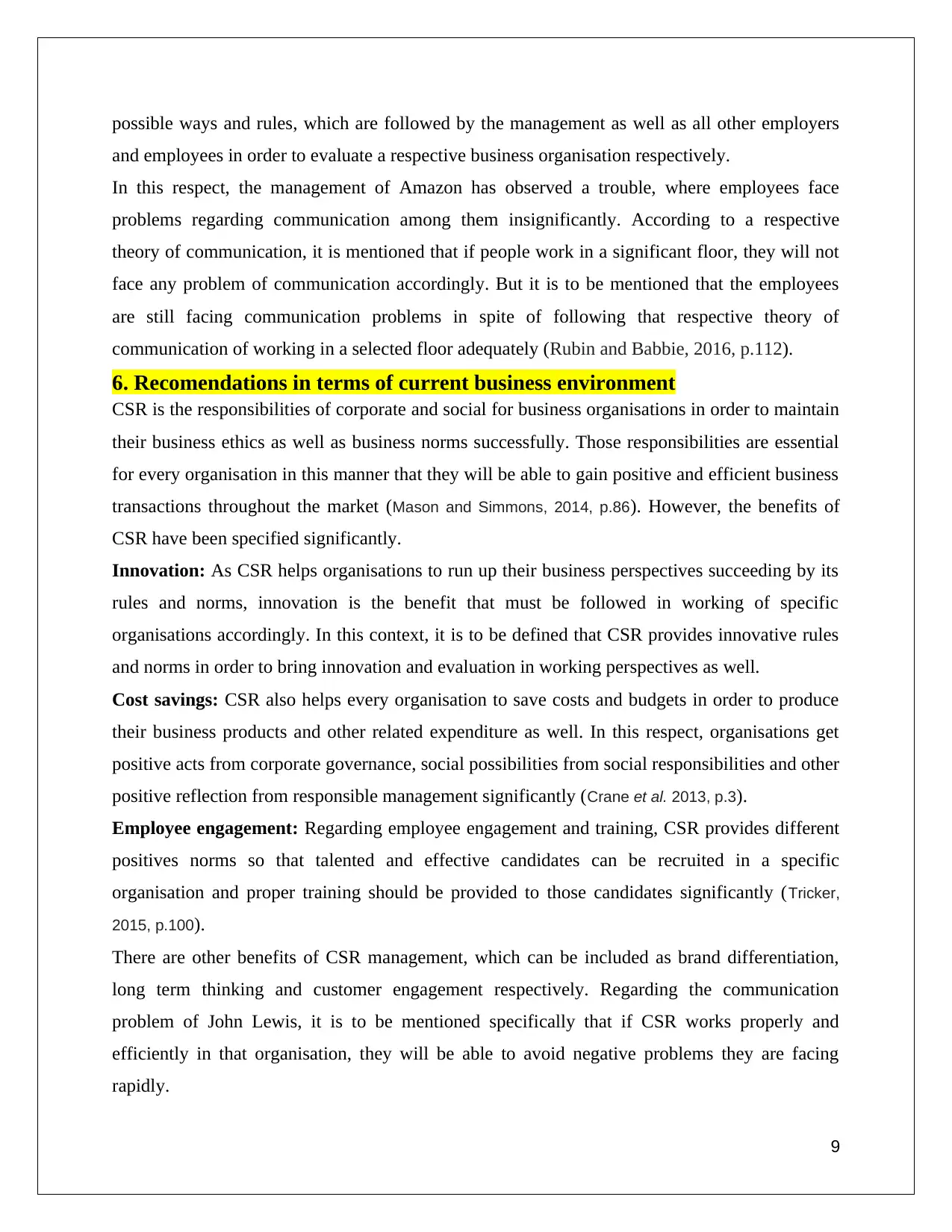
possible ways and rules, which are followed by the management as well as all other employers
and employees in order to evaluate a respective business organisation respectively.
In this respect, the management of Amazon has observed a trouble, where employees face
problems regarding communication among them insignificantly. According to a respective
theory of communication, it is mentioned that if people work in a significant floor, they will not
face any problem of communication accordingly. But it is to be mentioned that the employees
are still facing communication problems in spite of following that respective theory of
communication of working in a selected floor adequately (Rubin and Babbie, 2016, p.112).
6. Recomendations in terms of current business environment
CSR is the responsibilities of corporate and social for business organisations in order to maintain
their business ethics as well as business norms successfully. Those responsibilities are essential
for every organisation in this manner that they will be able to gain positive and efficient business
transactions throughout the market (Mason and Simmons, 2014, p.86). However, the benefits of
CSR have been specified significantly.
Innovation: As CSR helps organisations to run up their business perspectives succeeding by its
rules and norms, innovation is the benefit that must be followed in working of specific
organisations accordingly. In this context, it is to be defined that CSR provides innovative rules
and norms in order to bring innovation and evaluation in working perspectives as well.
Cost savings: CSR also helps every organisation to save costs and budgets in order to produce
their business products and other related expenditure as well. In this respect, organisations get
positive acts from corporate governance, social possibilities from social responsibilities and other
positive reflection from responsible management significantly (Crane et al. 2013, p.3).
Employee engagement: Regarding employee engagement and training, CSR provides different
positives norms so that talented and effective candidates can be recruited in a specific
organisation and proper training should be provided to those candidates significantly (Tricker,
2015, p.100).
There are other benefits of CSR management, which can be included as brand differentiation,
long term thinking and customer engagement respectively. Regarding the communication
problem of John Lewis, it is to be mentioned specifically that if CSR works properly and
efficiently in that organisation, they will be able to avoid negative problems they are facing
rapidly.
9
and employees in order to evaluate a respective business organisation respectively.
In this respect, the management of Amazon has observed a trouble, where employees face
problems regarding communication among them insignificantly. According to a respective
theory of communication, it is mentioned that if people work in a significant floor, they will not
face any problem of communication accordingly. But it is to be mentioned that the employees
are still facing communication problems in spite of following that respective theory of
communication of working in a selected floor adequately (Rubin and Babbie, 2016, p.112).
6. Recomendations in terms of current business environment
CSR is the responsibilities of corporate and social for business organisations in order to maintain
their business ethics as well as business norms successfully. Those responsibilities are essential
for every organisation in this manner that they will be able to gain positive and efficient business
transactions throughout the market (Mason and Simmons, 2014, p.86). However, the benefits of
CSR have been specified significantly.
Innovation: As CSR helps organisations to run up their business perspectives succeeding by its
rules and norms, innovation is the benefit that must be followed in working of specific
organisations accordingly. In this context, it is to be defined that CSR provides innovative rules
and norms in order to bring innovation and evaluation in working perspectives as well.
Cost savings: CSR also helps every organisation to save costs and budgets in order to produce
their business products and other related expenditure as well. In this respect, organisations get
positive acts from corporate governance, social possibilities from social responsibilities and other
positive reflection from responsible management significantly (Crane et al. 2013, p.3).
Employee engagement: Regarding employee engagement and training, CSR provides different
positives norms so that talented and effective candidates can be recruited in a specific
organisation and proper training should be provided to those candidates significantly (Tricker,
2015, p.100).
There are other benefits of CSR management, which can be included as brand differentiation,
long term thinking and customer engagement respectively. Regarding the communication
problem of John Lewis, it is to be mentioned specifically that if CSR works properly and
efficiently in that organisation, they will be able to avoid negative problems they are facing
rapidly.
9
⊘ This is a preview!⊘
Do you want full access?
Subscribe today to unlock all pages.

Trusted by 1+ million students worldwide
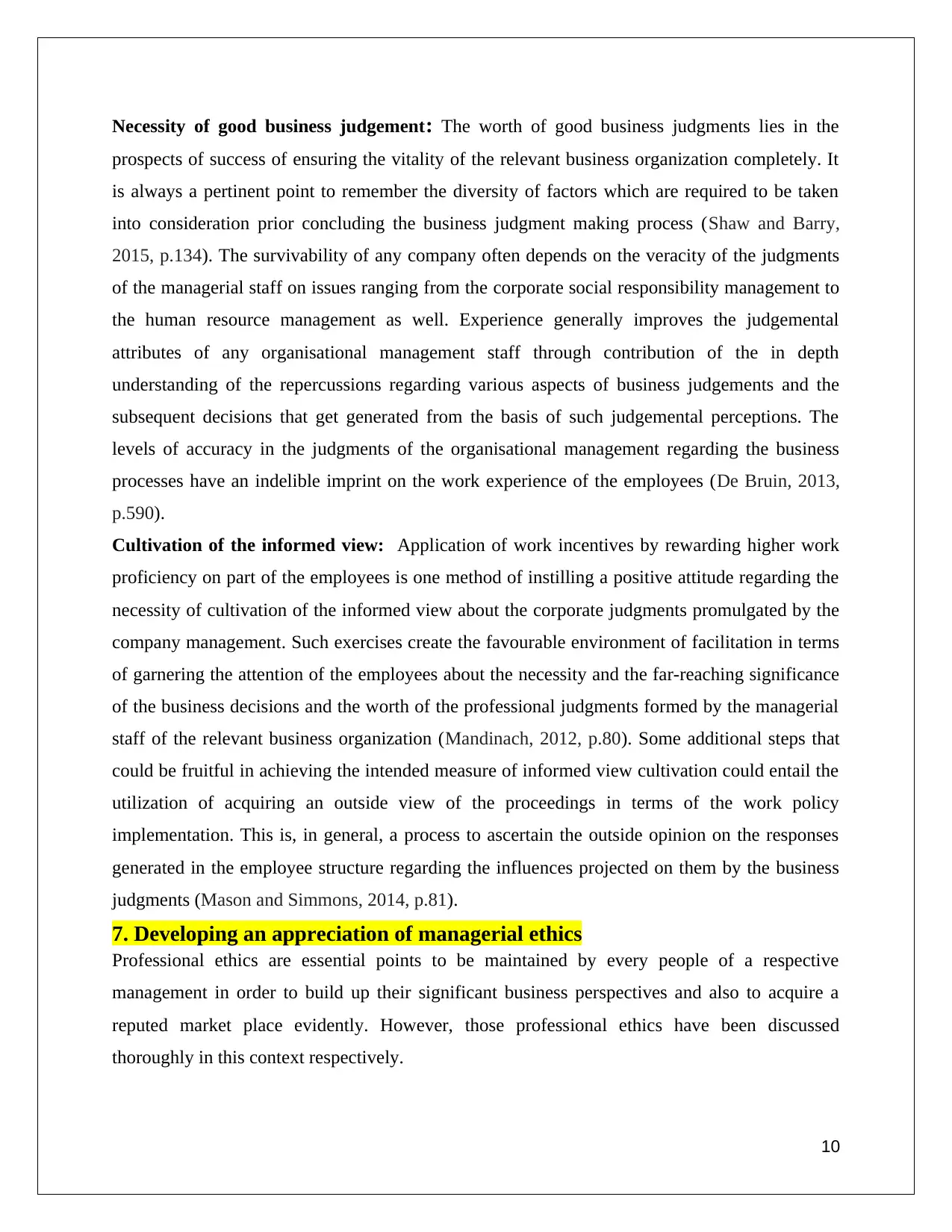
Necessity of good business judgement: The worth of good business judgments lies in the
prospects of success of ensuring the vitality of the relevant business organization completely. It
is always a pertinent point to remember the diversity of factors which are required to be taken
into consideration prior concluding the business judgment making process (Shaw and Barry,
2015, p.134). The survivability of any company often depends on the veracity of the judgments
of the managerial staff on issues ranging from the corporate social responsibility management to
the human resource management as well. Experience generally improves the judgemental
attributes of any organisational management staff through contribution of the in depth
understanding of the repercussions regarding various aspects of business judgements and the
subsequent decisions that get generated from the basis of such judgemental perceptions. The
levels of accuracy in the judgments of the organisational management regarding the business
processes have an indelible imprint on the work experience of the employees (De Bruin, 2013,
p.590).
Cultivation of the informed view: Application of work incentives by rewarding higher work
proficiency on part of the employees is one method of instilling a positive attitude regarding the
necessity of cultivation of the informed view about the corporate judgments promulgated by the
company management. Such exercises create the favourable environment of facilitation in terms
of garnering the attention of the employees about the necessity and the far-reaching significance
of the business decisions and the worth of the professional judgments formed by the managerial
staff of the relevant business organization (Mandinach, 2012, p.80). Some additional steps that
could be fruitful in achieving the intended measure of informed view cultivation could entail the
utilization of acquiring an outside view of the proceedings in terms of the work policy
implementation. This is, in general, a process to ascertain the outside opinion on the responses
generated in the employee structure regarding the influences projected on them by the business
judgments (Mason and Simmons, 2014, p.81).
7. Developing an appreciation of managerial ethics
Professional ethics are essential points to be maintained by every people of a respective
management in order to build up their significant business perspectives and also to acquire a
reputed market place evidently. However, those professional ethics have been discussed
thoroughly in this context respectively.
10
prospects of success of ensuring the vitality of the relevant business organization completely. It
is always a pertinent point to remember the diversity of factors which are required to be taken
into consideration prior concluding the business judgment making process (Shaw and Barry,
2015, p.134). The survivability of any company often depends on the veracity of the judgments
of the managerial staff on issues ranging from the corporate social responsibility management to
the human resource management as well. Experience generally improves the judgemental
attributes of any organisational management staff through contribution of the in depth
understanding of the repercussions regarding various aspects of business judgements and the
subsequent decisions that get generated from the basis of such judgemental perceptions. The
levels of accuracy in the judgments of the organisational management regarding the business
processes have an indelible imprint on the work experience of the employees (De Bruin, 2013,
p.590).
Cultivation of the informed view: Application of work incentives by rewarding higher work
proficiency on part of the employees is one method of instilling a positive attitude regarding the
necessity of cultivation of the informed view about the corporate judgments promulgated by the
company management. Such exercises create the favourable environment of facilitation in terms
of garnering the attention of the employees about the necessity and the far-reaching significance
of the business decisions and the worth of the professional judgments formed by the managerial
staff of the relevant business organization (Mandinach, 2012, p.80). Some additional steps that
could be fruitful in achieving the intended measure of informed view cultivation could entail the
utilization of acquiring an outside view of the proceedings in terms of the work policy
implementation. This is, in general, a process to ascertain the outside opinion on the responses
generated in the employee structure regarding the influences projected on them by the business
judgments (Mason and Simmons, 2014, p.81).
7. Developing an appreciation of managerial ethics
Professional ethics are essential points to be maintained by every people of a respective
management in order to build up their significant business perspectives and also to acquire a
reputed market place evidently. However, those professional ethics have been discussed
thoroughly in this context respectively.
10
Paraphrase This Document
Need a fresh take? Get an instant paraphrase of this document with our AI Paraphraser
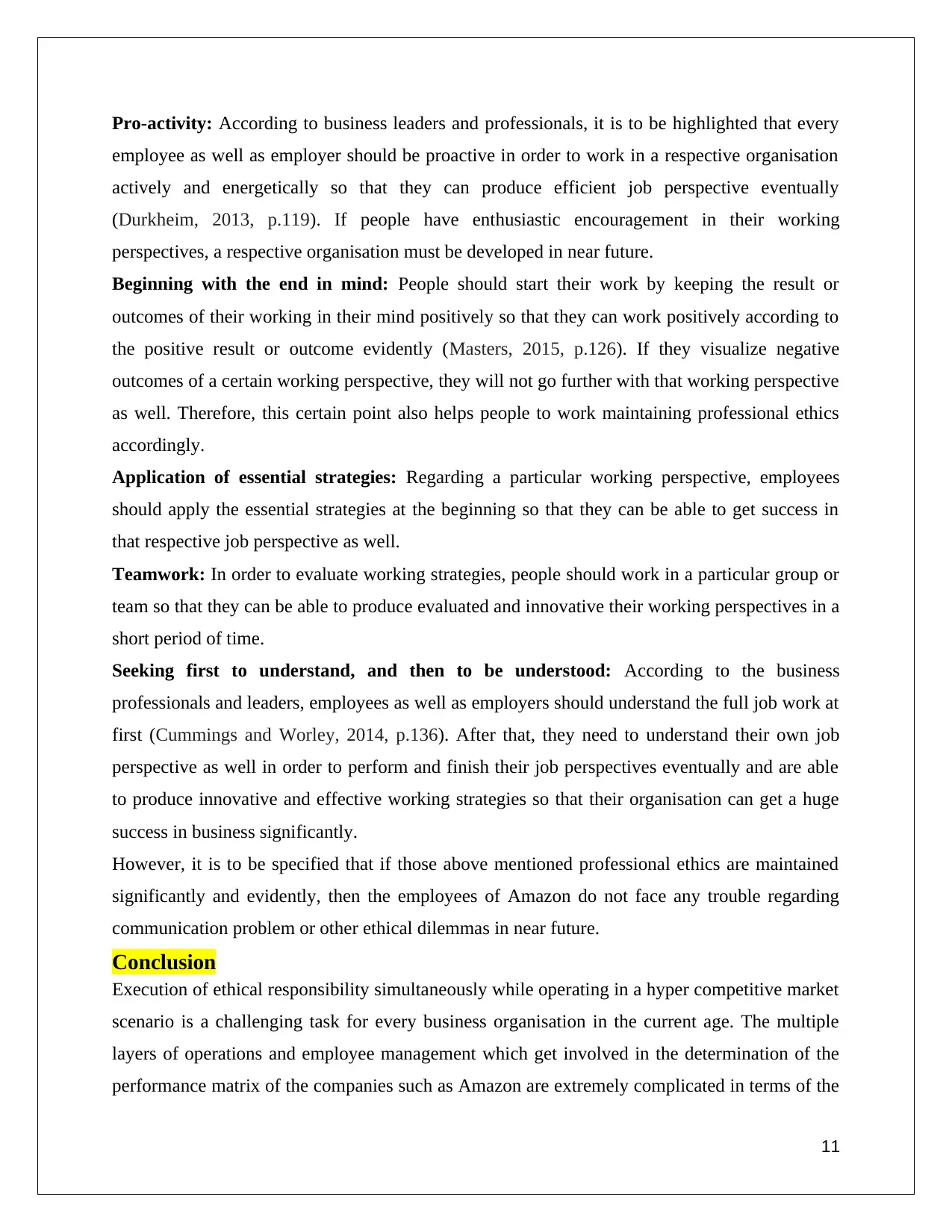
Pro-activity: According to business leaders and professionals, it is to be highlighted that every
employee as well as employer should be proactive in order to work in a respective organisation
actively and energetically so that they can produce efficient job perspective eventually
(Durkheim, 2013, p.119). If people have enthusiastic encouragement in their working
perspectives, a respective organisation must be developed in near future.
Beginning with the end in mind: People should start their work by keeping the result or
outcomes of their working in their mind positively so that they can work positively according to
the positive result or outcome evidently (Masters, 2015, p.126). If they visualize negative
outcomes of a certain working perspective, they will not go further with that working perspective
as well. Therefore, this certain point also helps people to work maintaining professional ethics
accordingly.
Application of essential strategies: Regarding a particular working perspective, employees
should apply the essential strategies at the beginning so that they can be able to get success in
that respective job perspective as well.
Teamwork: In order to evaluate working strategies, people should work in a particular group or
team so that they can be able to produce evaluated and innovative their working perspectives in a
short period of time.
Seeking first to understand, and then to be understood: According to the business
professionals and leaders, employees as well as employers should understand the full job work at
first (Cummings and Worley, 2014, p.136). After that, they need to understand their own job
perspective as well in order to perform and finish their job perspectives eventually and are able
to produce innovative and effective working strategies so that their organisation can get a huge
success in business significantly.
However, it is to be specified that if those above mentioned professional ethics are maintained
significantly and evidently, then the employees of Amazon do not face any trouble regarding
communication problem or other ethical dilemmas in near future.
Conclusion
Execution of ethical responsibility simultaneously while operating in a hyper competitive market
scenario is a challenging task for every business organisation in the current age. The multiple
layers of operations and employee management which get involved in the determination of the
performance matrix of the companies such as Amazon are extremely complicated in terms of the
11
employee as well as employer should be proactive in order to work in a respective organisation
actively and energetically so that they can produce efficient job perspective eventually
(Durkheim, 2013, p.119). If people have enthusiastic encouragement in their working
perspectives, a respective organisation must be developed in near future.
Beginning with the end in mind: People should start their work by keeping the result or
outcomes of their working in their mind positively so that they can work positively according to
the positive result or outcome evidently (Masters, 2015, p.126). If they visualize negative
outcomes of a certain working perspective, they will not go further with that working perspective
as well. Therefore, this certain point also helps people to work maintaining professional ethics
accordingly.
Application of essential strategies: Regarding a particular working perspective, employees
should apply the essential strategies at the beginning so that they can be able to get success in
that respective job perspective as well.
Teamwork: In order to evaluate working strategies, people should work in a particular group or
team so that they can be able to produce evaluated and innovative their working perspectives in a
short period of time.
Seeking first to understand, and then to be understood: According to the business
professionals and leaders, employees as well as employers should understand the full job work at
first (Cummings and Worley, 2014, p.136). After that, they need to understand their own job
perspective as well in order to perform and finish their job perspectives eventually and are able
to produce innovative and effective working strategies so that their organisation can get a huge
success in business significantly.
However, it is to be specified that if those above mentioned professional ethics are maintained
significantly and evidently, then the employees of Amazon do not face any trouble regarding
communication problem or other ethical dilemmas in near future.
Conclusion
Execution of ethical responsibility simultaneously while operating in a hyper competitive market
scenario is a challenging task for every business organisation in the current age. The multiple
layers of operations and employee management which get involved in the determination of the
performance matrix of the companies such as Amazon are extremely complicated in terms of the
11
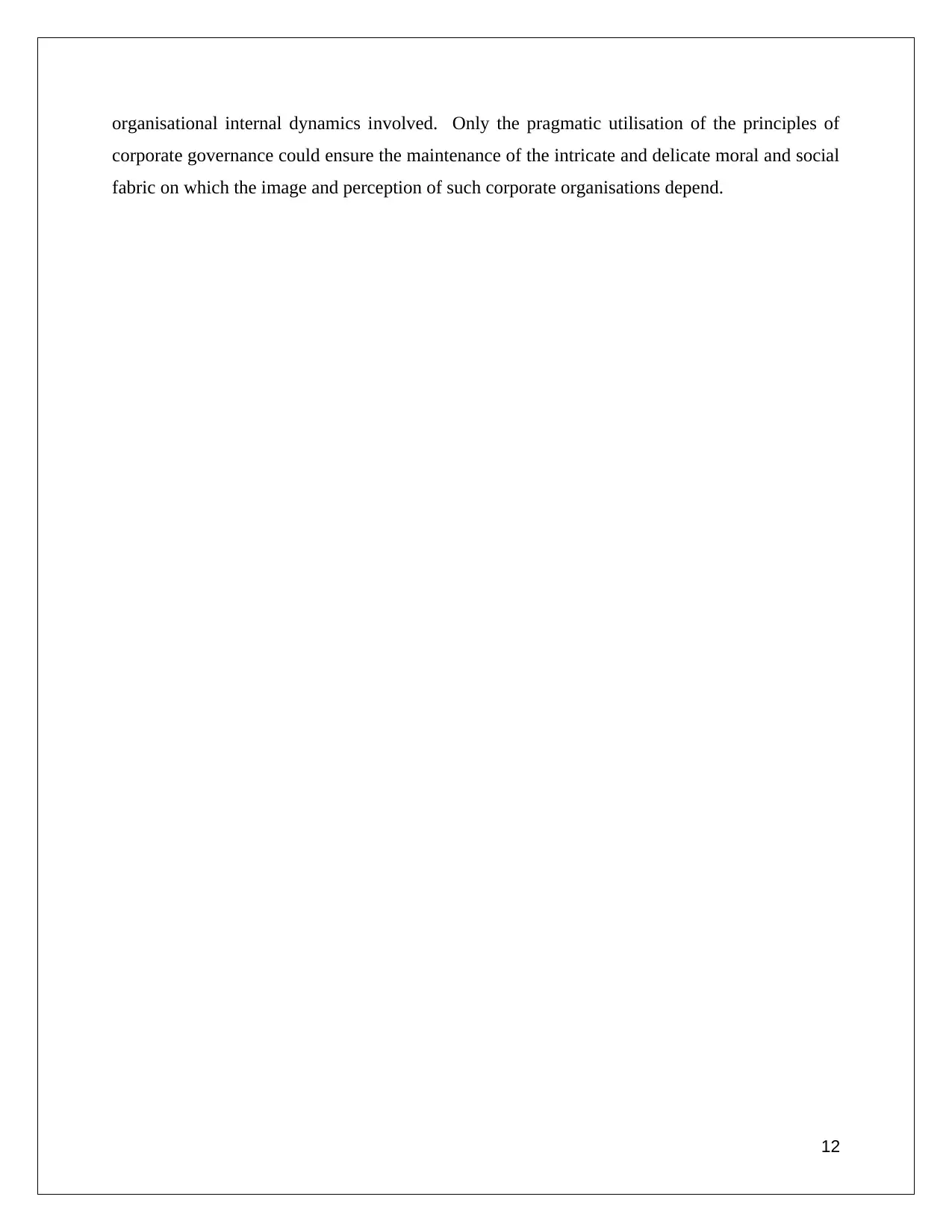
organisational internal dynamics involved. Only the pragmatic utilisation of the principles of
corporate governance could ensure the maintenance of the intricate and delicate moral and social
fabric on which the image and perception of such corporate organisations depend.
12
corporate governance could ensure the maintenance of the intricate and delicate moral and social
fabric on which the image and perception of such corporate organisations depend.
12
⊘ This is a preview!⊘
Do you want full access?
Subscribe today to unlock all pages.

Trusted by 1+ million students worldwide
1 out of 14
Related Documents
Your All-in-One AI-Powered Toolkit for Academic Success.
+13062052269
info@desklib.com
Available 24*7 on WhatsApp / Email
![[object Object]](/_next/static/media/star-bottom.7253800d.svg)
Unlock your academic potential
Copyright © 2020–2026 A2Z Services. All Rights Reserved. Developed and managed by ZUCOL.




